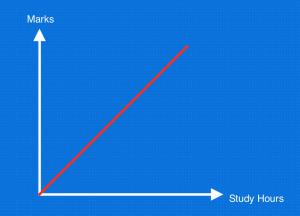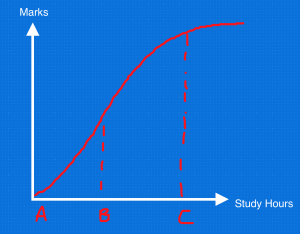A lot of people seem to think that there is a linear relationship between the amount of hours that you study, and the result that you achieve. There isn’t a lot of thought given to the stages of study.
To put that in English, it means this. People think every hour of study is as useful as the hour before it. That the 16th hour of writing essays is as useful as the 17th hour of writing essays. That the second hour of math study is just as useful as the first. The thing is, this is actually not true.
Really, it looks more like this.
This article is going to chat about what I view to be the three stages of studying for a subject, and how to recognise when you are in these stages of studying, so you can stages of your results, especially around exam time.
Stage A: Starting Up
Generally, when you start studying for an exam, let’s be honest. It probably isn’t that productive. Well actually, you might be one of those people that can smash out heaps of past papers straight away, no issues. I seriously envy you, and I’m sure many other people do too.
For a lot of people, the initial stages of studying are slow. You are rusty on the old concepts. You probably aren’t working as hard or as fast as you possibly could. You are probably procrastinating. This is absolutely cool!
The first of these stages of study can last a little while, and it is the period your brain takes to re-adapt to the old concepts enough to actually engage with the content. It’s a mini version of that, “I don’t get it” period when you did relativity back in Term 4 2015. Or that massive amount of time you took to get the hang of the applications of calculus questions this term. It’s your brain re-learning the content, only this time, it is much faster.
The trick with the first few hours is to accept that it will be slow moving for a little while. You’ll work for hours with little benefit. Things will take a while to sink in at first. And that is okay!
Stage B: Taking Off
The best analogy I have for this is learning to drive. I don’t know about others, but I was terrible at the start. Absolutely hopeless. My Mum probably said prayers every time she took me out on the road. If we were talking about stages of study, that would have been Stage A.
Then all of a sudden, it clicked! I could drive to school. I could drive pretty well un-assisted. I knew how the road worked on my own. Don’t get me wrong, I was still a Learner in every sense, but I’d gone over a hump. Now, I could learn more effectively and engage with the new situations on my own. In terms of the stages of study, this was Stage B.
As you are studying for a subject, you will pass over this hypothetical hump. And suddenly, things will move a lot faster. You’ll click with concepts more easily. You’ll go through past papers and learn from your mistakes much more readily. You’ve gone from being completely shut out from the content, to being able to engage with it, learn from it, and practice, in a way that feels natural.
Different people take different amounts of time to reach this middle point in the three stages of study. 2 hours. 10 hours. 10 days. It totally depends! However, once you are here, you want to spend as much time studying in this stage as you possibly can.
Why? Because you are at your most productive. You are actively engaging with the content and every hour of study you do is teaching you something. There are no empty hours trying to remember the content. Every hour will now directly translate in some way to an improvement in your exam results. This is the time to study, because the hours in this stage are worth more than an hour at any other time.
Stage C: Slowing Down
I’ll go back to my driving analogy. After about 70/80 logbook hours, I could have sat my P’s test and potentially passed. Obviously I couldn’t because I needed 120 hours, but I didn’t need those hours. I knew what I needed to know. My last few logbook hours were mostly spent doing things like perfecting the parallel park, practicing overtaking, driving on tricky roads, etc. Not things that would directly make me a better driver overall, but would improve my response in specific situations (and thus increase my chances of getting my license, lol)
This point in my driving ‘career’ was Stage C in the stages of study.
There will reach a point for some students where they start getting 90 or 95 and above in all their past papers for Mathematics (for example). They know the content. They can apply it. They start focusing on the super hard concepts, the extra work to give them that little bit of edge. Extension questions, trick questions, etc.
Hours in this stage are much less useful to a student on the whole than those in Stage B. The reason why? This is the main point of this article: It can take twice as long to go from an 80 to a 90, as it does to go from a 70 to an 80. It almost definitely takes twice as long to go from a 95 to a 98, as it does to go from a 90 to a 95. Obviously these are estimates, but the point is this.
Once you get going, every extra mark you want takes longer to achieve than the mark before it.
Let’s consider an example: Let’s say you have the choice of spending 10 hours studying for Math and English, or 20 hours studying for Mathematics. If you study 10 hours each, that might be enough to get you a Band 5 in both. Great! If instead you put all your time into Mathematics, that might be enough to push you into Band 6 range, but, those 10 hours lost drop you to Band 3 in English.
Looking at it this way, those hours were better invested in English, because the marks there are cheaper. This is actually a pretty different way of looking at it, almost like an economy. But this is a way of thinking that massively helped me in my HSC.
After The Stages of Study: Burn Out
I’ll quickly mention this as an afterthought; many would argue that there is four stages of study. The fourth would be colloquially called burning out. Basically, this is when you study so much that seeing any HSC related object makes you gag, and you quit your shit because it doesn’t matter what you get anymore.
Burning out is a topic for another day, but I’ll say this: Just keep swimming. It will all be over in just a few months; you’ve done the work now. Why waste all those hard working hours?
So the moral of this story is this. Allocate your hours of study carefully, because hours of study often have diminishing returns. Every hour for a subject (after the first few) is less useful than the one before it. You are far better off spreading your time evenly, than putting all your eggs in one basket.
This leads to the question; How do I divide my time evenly? Come back next week and I’ll be chatting about the best way to keep these stages of study in mind, while you create a study timetable for your big exam blocks.








